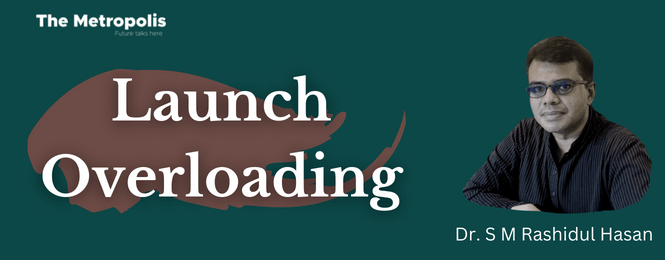Passenger ships, popularly known as ‘launch’, have been the most popular mode of transport amongst the people of the southern parts of Bangladesh. Almost 12.3 percent of our rural population have reasonable access to the transportation system through boats and launches only. Furthermore, it is also the cheapest mode of transport and is favored by most of the people who have access to the river transport. In spite of having such importance, this inland water transportation system safety has always been heavily neglected. As a result, accidents are ruthlessly taking peoples’ lives and livelihoods.
A study conducted on 67 inland passenger ships’ accidents in Bangladesh revealed that one-third of these accidents were linked to the overloading. The other causes were human error, grounding, collision and so on. Now the question is why overloading in the boats or launches are still considered as a normal practice? Is it possible to overcome this problem just by implementing stringent rules?
It is very easy to point out that the ship owners allow overloading to increase their profitability. However, the socio-economic aspects are a little bit different. Let us do a simple math:
A passenger ship, having an approved passenger capacity of 1000 and operating in between Dhaka and Barishal, has a daily operation break event point at 10-lac taka. This means, to make profit, the owner shall fix the average fare at a rate more than 1 thousand taka. To register a good profit margin, he can easily increase the fare. Considering the socio-economic condition of the people in Bangladesh, how many people can afford this extra fare? A small percentage only, perhaps!
Due to this, boats and launches here always ply with overloading, as if it is normal to do so, even during inclement weather condition. People also take this casually as long as water does not come up to the main deck, in other words, as long as the boat or the launch does not submerge in water or sink. The inherent safety in the ship, maintained with the freeboard (the height from the water surface to the main deck of the vessel), is often ignored or misunderstood, which heavily compromises the safety. Of course, there are other causes of accidents, but overloading amplifies the probability of the other risks as well.
Now the problem can be theoretically solved by increasing the ticket price and strictly maintain the approved capacity. Considering the practical aspects, this is not feasible at all. So, can it be solved by increasing the number of ships? The answer is no because the unit running cost would still be the same. Practically speaking, if the socio-economic condition of Bangladeshi people does not improve significantly, the number of passengers will be always more than the approved capacity in most of the boats and launches.
As a developing and growing economy country, we can certainly expect improvement of this condition, but it may take decades to reach that level. Government can give subsidies to ensure safety now. However, there are many other important sectors for government to prioritize. Now the possible solution lies within the hands of the skilled researchers and naval architects who can develop and design more energy efficient boats and launches which will reduce the cost and increase the income with higher passenger capacity.
We have been observing the same inefficient design pattern of the ships and boats since the distant past. Only the sizes have increased and interiors have been extravagant. But the quality of the design has not improved much due to reluctance from the owners and also the lack of testing and research facilities in Bangladesh. This situation is going to improve significantly with the introduction of Ship Model Testing Center (Towing Tank) in Bangladesh University of Engineering and Technology (BUET). Upon the completion of this ongoing project in the year 2023, the naval architects and researchers will get a unique opportunity to test their designs under extreme weather, wave and current situations, even before the actual construction phase. With ample research fund from both the government and donor organizations, safe, efficient and affordable ships can become a reality then.
Dr. S M Rashidul Hasan is Assistant Professor at the Department of Naval Architecture and Offshore Engineering in Bangabandhu Sheikh Mujibur Rahman Maritime University, Bangladesh



